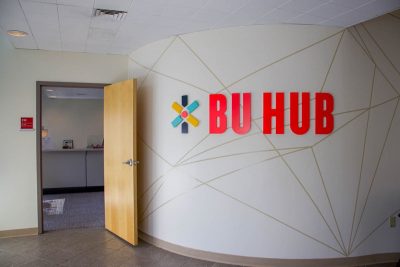With the Hub, Boston University’s recent system of general education requirements launched 2018, students are tasked with finding classes each semester that work with their schedule, their major, interests — and have any of the 26 Hub units they need. This June, Hub faculty launched a new initiative of social justice-oriented course pathways to organize Hub units.

BU launched Hub Pathways: an optional method students can use to fulfill hub units. Each pathway is a curated list of Hub classes of all units focused on a particular theme. There are currently two different Hub Pathways students can choose to pursue — a Social and Racial Justice pathway and an Environment and Society pathway — each designed to help students engage with a topic they care about while staying on track to get all units before graduation.
“The BU Hub Pathways are an optional way for undergraduates to fulfill some or many of their general education requirements by taking Hub courses from across the University with a focus on an interdisciplinary topic of global significance,” according to the Hub Pathways website.
Eric Jarvis, the associate director of BU Hub, said the Social and Racial Justice Pathway and the Environment and Society Pathway were “logical starting points for the Hub.”
“The University right now is deeply engaged in both of those issues,” Jarvis said. “We also know from students that those are two areas of passion.”
Students can choose to take as many or as few courses in a particular pathway as they want. While completing the pathway doesn’t give students any credentials beyond the Hub units themselves, Jarvis said the pathways are intended to help students discover new courses outside of their major.
“You can think of Hub Pathways [as] curated lists of Hub courses that focus on a broad topic of global significance,” Jarvis said. “Courses in each Hub pathway cover most of the Hub areas, and they allow students to approach a topic from multiple perspectives while meeting their general education requirements.”
The hope is that students will benefit from the new Hub Pathways by being able to more easily discover courses and explore their interests across multiple disciplines, Jarvis said.
Xavier Ruiz is a rising senior in the College of Arts and Sciences. Ruiz is on the BU Hub Student Advisory Board — a group of students from different majors who give BU feedback on the Hub.
“We help make various decisions regarding how classes and direction of the hub,” he said. “It’s just a student voice club for the Hub board to get some input from students.”
Ruiz said that especially since the Class of 2022 will be the first class to complete all four years with the Hub, rising seniors didn’t have as many Hub options as incoming freshmen will when choosing their Hub courses. The pathways help introduce some new opportunities.
“Having these pathways is really helpful,” said Ruiz. “It’s for students who just want something laid out for them so they don’t really have to think about it.”
He also added that “the beauty” of the Hub is that students have the freedom to decide how they can fulfill it themselves, taking what they want from the pathways if they choose or not.
Jarvis said he also hopes that the Hub pathways help highlight the new choices that students can make to fulfill their Hub units.
The Hub pathways, like the Hub itself, aims to expose students to a wide-ranging, interdisciplinary education, Jarvis said. According to Jarvis, interdisciplinary education is at the “heart” of what the Hub is.
“The Hub is the place where undergraduate students will develop the breadth of your learning,” Jarvis said. “Our hope is that the pathways will build upon what the Hub is already offering students and that is the opportunities to explore widely across disciplines, and just being aware of the many choices in the curriculum.”


























































































































